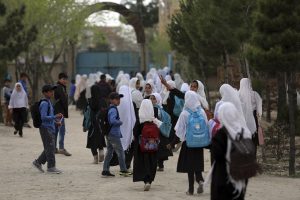Almost a month after approving $1 billion in funds to address urgent needs in Afghanistan, the World Bank has reportedly suspended four projects after the Taliban denied girls the right to attend school beyond the sixth grade.
International donors have struggled since the Taliban’s August 2021 takeover of Afghanistan to balance the needs of Afghans against concerns about inadvertently supporting (and funding) the Taliban.
On March 1, the World Bank announced a plan in which $1 billion from the Afghanistan Reconstruction Trust Fund (ARTF) would be routed through “recipient-executed grants” to various U.N. agencies and international NGOs to address the needs of desperate Afghans, without pumping money into the Taliban government. ARTF donors were to decide on four projects, worth $600 million, “to support urgent needs in the education, health, and agriculture sectors, as well as community livelihoods, with a strong focus on ensuring that girls and women participate and benefit from the support.”
On March 30, Reuters and the BBC, among others, reported that the World Bank was suspending the four projects. According to the BBC, the projects will be restarted “only when the bank is confident that its goals can be met.”
The Taliban had pledged to allow girls to attend school past the sixth grade when the new term started in late March. But on March 23, as girls across the country showed up to their classrooms, they were turned away. Education Ministry spokesman Aziz Ahmad Rayan said, “We assure our Afghan sisters that they would be allowed to attend school once our leadership makes a decision,” at a ceremony marking the opening of schools only a week after saying the Taliban would allow girls to return to school. According to a statement from the ministry after its reversal, the outstanding decisions relate to uniforms “in accordance with Sharia law and Afghan tradition” for female students.
For many, the Taliban’s excuses are hollow. And although many contemporary news stories referred to the recent reversal regarding girls attending school as “surprising” or “shocking” it was anything but. We have been here before:
A peek at the archives of newspaper issues past illustrates just cause to be skeptical, even when there are tiny glimmers of hope and progress. This is most clear when it comes to the rights of women in Afghanistan, which rather than an end in themselves have been seen cynically as a bargaining chip.
An April 1998 New York Times article noted that “Taliban leaders seem aware that [women’s rights] is a hot issue internationally, and appear to be using it as a bargaining chip for more international aid.”
In the 1990s, when the Taliban were last in power in Afghanistan, the international community had many of the same discussions it is having now. Can the Taliban be pushed toward moderation with aid the incentive and progress on women’s rights the price?
The Taliban’s decision last week to bar girls from secondary school was arguably a product of tension within the Taliban movement itself. Kathy Gannon of the Associated Press explained the decision like this: “The decision to postpone the return of girls at the higher grade levels appeared to be a concession to the rural and deeply tribal backbone of the hard-line Taliban movement that in many parts of the countryside are reluctant to send their daughters to school.”
Whatever the internal reasons for the decision, it yielded both international condemnation and domestic outcry.
The United States canceled a planned meeting with Taliban officials in Qatar. Ten members of the U.N. Security Council — Albania, Brazil, France, Gabon, Ireland, Mexico, U.K., U.S., Norway, and the UAE — called on the Taliban to reopen schools for girls. “All girls in Afghanistan should be able to go to school,” the statement said, calling the reversal “a profoundly disturbing set-back.” The European Union issued a similar statement, saying that the decision “further erodes the Taliban’s chances to gain the domestic legitimacy that they seek, which should be earned by inclusive and responsible governance rather than through the use of force and violence.”
Despite the clear risks of doing so, two dozen girls and women staged a protest outside the Ministry of Education last week.
The World Bank’s suspending of its planned projects fits into this backlash. It highlights once again the tug-of-war between the Taliban and the international community over critical matters of women’s rights and development.













